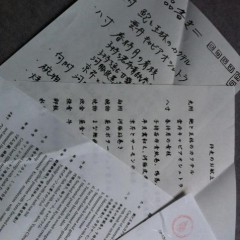3日間連続の講演。頭がパンクしそう。今度は地元の商工会の主催で京都からのコンサルタント坂本 洋さんが来ました。
写真をよく見て下さい。4種類のメニューです。中華っぽい手書きのから英文付き、赤いハンコ付き、和紙の綺麗なのまで。
実は、内容は皆一緒です。しかし、手書きなのなら5000円ぐらいな価値しか感じないよね。綺麗なのは実物で、実は2万円のメニューです。
伝え方によって、価値観が全然違う。
「おそばです。」
と
「そば打ち歴20年の名人が打った10割そばです。」
もしくは
「美容に関心のある女性に食べてもらいたいそばです。」
伝え方によってターゲットが全然違ってくる。
さあ、我が亀清旅館はどんな方に泊まってもらいたいかと
考えないと駄目。
第一歩はお品書き作成だな。
坂本先生、良い刺激を有難うございました。
3rd Seminar in as many days -- my head feels like it's about to explode. This one was sponsored by our local chamber of commerce. Hiroshi Sakamoto came from Kyoto to give a talk on menus, and creative ways to express them.
Take a look at the picture. 4 menus, from a sloppy hand-written one that looks like it's from a Chinese restaurant, to a formal one with English translation and a red hanko stamp, on washi paper.
Actually, the menu contents are all the same. But whereas the handwritten one looks like a menu with a price of around 5000 yen, the real, formal one goes for 20,000 yen.
It's all in the way the menu is expressed.
Or, consider this:
"Soba Noodles"
vs.
"100% Buckwheat Flour Soba Noodles Hand-Made by a 20-Year Master Chef"
or, "Soba Noodles For Ladies Intersted in Beauty Care"
Depending on the expression, the target customer base is totally different.
So, what is Kamesei Ryokan's target customer base?
I think the first thing we need to do is to make a menu!
Sakamoto-san, thank you for your stimulating ideas!




